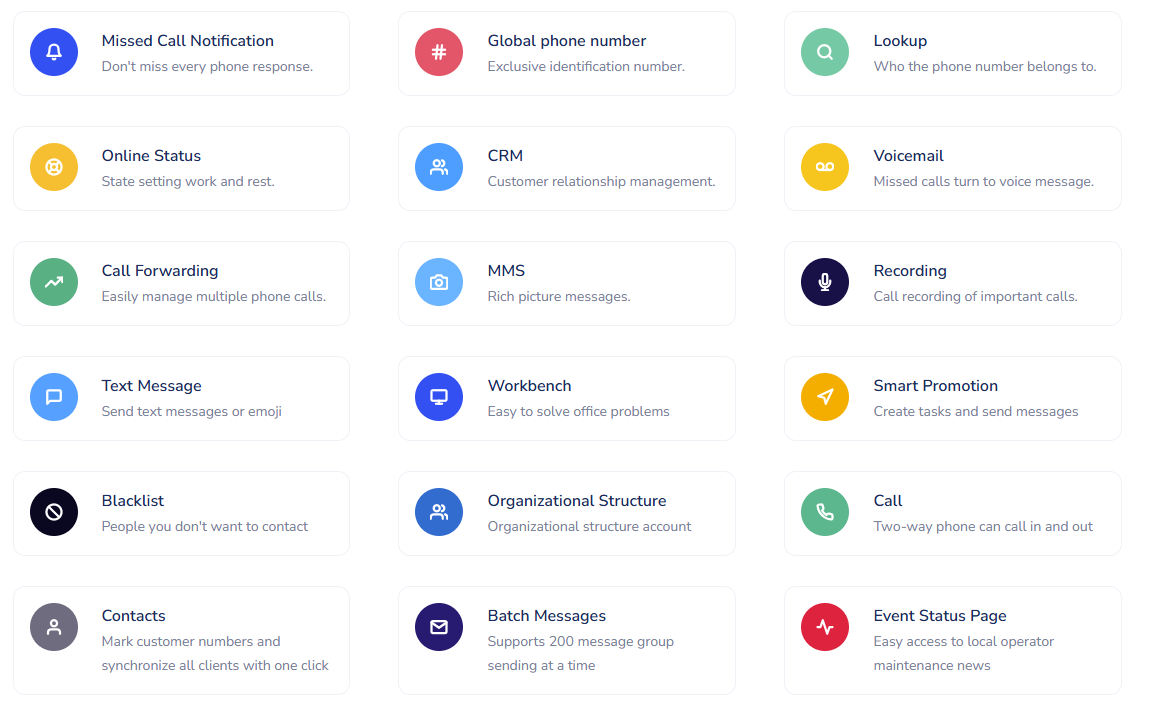In recent years, with the acceleration of the global economic integration process, the signing and entry into force of regional trade agreements (RTAs) have brought unprecedented market opportunities to enterprises. For example, the Regional Comprehensive Economic Partnership (RCEP), the United States-Mexico-Canada Agreement (USMCA), and the African Continental Free Trade Area Agreement (AfCFTA), etc., have all played an important role in reducing tariff barriers and promoting cross-border trade. However, when enterprises enter new markets, they often face the problem of poor communication with local customers and partners. Issues such as language barriers, high international communication costs, and insufficient local trust may all hinder the internationalization process of enterprises.
Against this backdrop, IntBell virtual numbers, with their global coverage and flexible and convenient communication solutions, have become a powerful assistant for enterprises to expand into new markets. By providing local virtual numbers within the agreement regions, IntBell helps enterprises establish contacts with local markets at a low cost and high efficiency, enabling them to quickly open up business situations.

New Opportunities Brought by Regional Trade Agreements, but Enterprises Face Communication Challenges
The entry into force of regional trade agreements has liberalized the flow of goods, services, and capital among member states, allowing enterprises to enter new markets more conveniently. For instance, the RCEP covers 15 Asia-Pacific countries, accounting for 30% of the global GDP, providing enterprises with a huge consumer market; the AfCFTA integrates 54 African countries, forming one of the world’s largest free trade areas. However, for enterprises to truly gain a foothold in these markets, relying solely on policy dividends is not enough. They also need to address the following key issues:
- Localized communication barriers: Many overseas customers prefer to contact enterprises through local numbers. The high cost and inconvenience of international long-distance calls often discourage potential customers.
- Trust issues: Enterprises with local numbers are more likely to gain the trust of local customers. Relying solely on international numbers or online customer service may raise doubts among customers.
- Difficulty in obtaining market information: Enterprises need to stay informed about local market demands and policy changes in a timely manner. However, the lack of local contact methods may lead to information lag.
IntBell Virtual Numbers: Breaking Down Communication Barriers and Facilitating Enterprise Globalization
As a leading global cloud communication service provider, IntBell offers enterprises virtual local numbers covering multiple countries and regions, supporting international two-way calls, SMS sending and receiving, and other functions, helping enterprises efficiently connect to the global market. Its core advantages include:
1. Obtaining local numbers at a low cost and enhancing customer trust
IntBell allows enterprises to apply for virtual local numbers in target markets without the need to set up a physical office. For example, a Chinese foreign trade company looking to expand into the Southeast Asian market can apply for local numbers in countries such as Singapore and Malaysia through IntBell, enabling local customers to make calls at local rates, greatly reducing communication costs, and enhancing brand credibility at the same time.
2. International two-way communication, seamlessly connecting global business
IntBell’s virtual numbers support incoming and outgoing calls from around the world. Enterprises can answer calls from all over the world through a unified management platform and maintain contact with overseas customers and suppliers at any time. Whether it is sales consultation, after-sales service, or business negotiations, efficient communication can be achieved.
3. SMS marketing and customer management, precisely reaching the target market
In addition to voice calls, IntBell also supports international SMS sending and receiving functions. Enterprises can send marketing messages, order notifications, verification codes, etc., to potential customers through local numbers, increasing customer interaction rates. For example, cross-border e-commerce companies can use local numbers to send promotional SMS to improve conversion rates.

Success Stories: Enterprises Quickly Enter New Markets with the Help of IntBell
Case 1: A technology company expands its business in Southeast Asia
A technology company providing SaaS services hopes to enter the Brazilian market, but local customers have a low acceptance of international numbers. Through IntBell’s Brazilian virtual number, the company successfully established a localized customer service system and established stable contacts with local partners. Its business grew by 60% within just half a year.
Case 2: A cross-border e-commerce company enters the European market
When a Chinese cross-border e-commerce company entered the Singaporean market, it found that local consumers preferred to consult product information by phone. Due to the high cost of international long-distance calls, many potential customers gave up contacting. Later, the enterprise applied for a local virtual number in Singapore through IntBell and set up a multilingual customer service system. As a result, the number of customer consultations increased by 40%, and the order conversion rate significantly improved.

Seize the Opportunity and Start a New Globalization Journey with IntBell
The entry into force of regional trade agreements has brought broad market space for enterprises. However, the key to success lies in the ability to quickly adapt to local needs and establish efficient communication channels. IntBell virtual numbers, with their flexibility, low cost, and global coverage, have become an ideal choice in the internationalization process of enterprises.

Whether you are a foreign trade enterprise, a cross-border e-commerce company, or a technology company, you can easily obtain local numbers in target markets through IntBell, break through geographical limitations, and seamlessly connect with global customers. Now, visit www.intbell.com, apply for your virtual number, and start a new globalization business journey!




